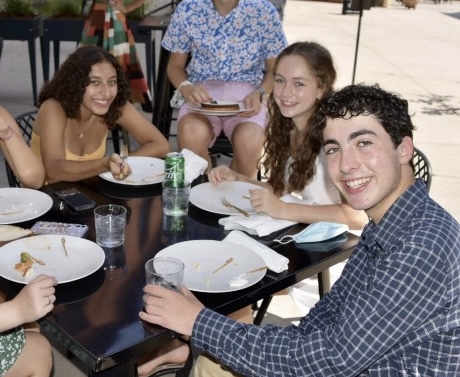Jewish Students Face Challenges Inside of Our Walls

Jewish students (from left to right) Nava Khurgel, Eliza Jaffe, and Solly Golubouff-Schragger, sit at a Congregation Beth Israel event.
November 3, 2021
In high schools across the country, it is common for students of the Jewish faith to feel naturally disadvantaged by their teachers. The leading cause of this: holidays that are meant to be fulfilling the students’ religious duties- through either spending the day at the temple, or doing community service work- are now spent focusing on school. The one theme through them all, however, is that the students are not meant to be doing school related activities on those days.
What’s the harm? Would this not mean that these students would get to take a break from their everyday lives? It has been expressed by Jewish students that the teachers and administrators at CHS have not been accommodating to these students. Teachers will penalize them for late work, despite the fact that they were obligated to miss school.
One student, who wishes to remain anonymous, has recently taken initiative to fix this problem. “There were two Jewish holidays in which I had to miss a certain class,” they described in a recent interview, “and I came back after so far behind, which was really stressful, and I got no help from my teacher.” The student’s frustration is apparent, and completely justified. They missed school, but felt as though CHS was not understanding enough of their situation. “Even though I got a religious excuse, it doesn’t make up for the fact that I continue to be a week behind in one of my hardest classes.”
However, they aren’t the only Jewish student at our school to feel this way. Tenth grader Solly Golubouff-Schragger described how his faith has affected his school life, or rather, how his school life has affected his faith. “As we all know, we take off [school] for Christmas break and those two weeks because that is when Christmas is. For Jewish people, our most sacred holidays are Rosh Hashanah and Yom Kippur, the high holy days, and on those days we have to miss a full day of school on our most sacred holidays. Not only that, but on those days we have to be stressed out about all of the work we are missing. It’s really challenging to try to catch up after missing all of this school or choosing between school and your faith, which is really unfair.” Sophomores Nava Khurgel and Eliza Jaffe, both members of the same Congregation Beth Israel class as Solly, express similar feelings. “It’s not just about that specific day,” Eliza says, “but it’s a continuous process.”
So, what happens now? It certainly isn’t simple. “I think that it’s a difficult solution, especially because Jewish holidays change every year, and it’s not just Jewish people and Christians- there are many other faiths at school.” Eliza says. “However, I think it is important to make sure we get those excused absences, and ensure that our teachers are willing to spend extra time with us, which is something that isn’t always implemented and isn’t always protected for us.” Nava expressed similar ideas. “I understand that it may be impossible to give us all days off, but the bare minimum is to make it easier on us and allow us to celebrate those holidays that we should.” Another suggestion was raised by the student who first brought this issue to the administration’s attention. “At some other schools, they don’t introduce new material on these holidays. I know that it’s not just Jewish people that have this, it’s other religions that are overlooked because they’re not the majority, and so this is a way to help solve this problem.”
The student describes that they had a conversation with Dr. Irizarry, CHS principal, about it, and are now in the process of constructing a letter to the school board for them to address this issue.
Through all of this, however, one thing is clear. The inequality that the Jewish and other religious populations at our school are forced to face is unjust. However, implementing policies, like not scheduling tests on religious holidays, or not assigning much new work, would greatly improve this issue. All four of these students expressed to KTR that they have peers who still attend school on their holy days instead of taking the day off, just because they would fall behind on school work otherwise. Solly says it best. “We live in a Christian-centric society, so this isn’t specifically anti-semetic by the administration- nobody is targeting Jewish people specifically. It is just so unfair that we have to work so hard to fit our faith into the world because it’s not designed for us.”





